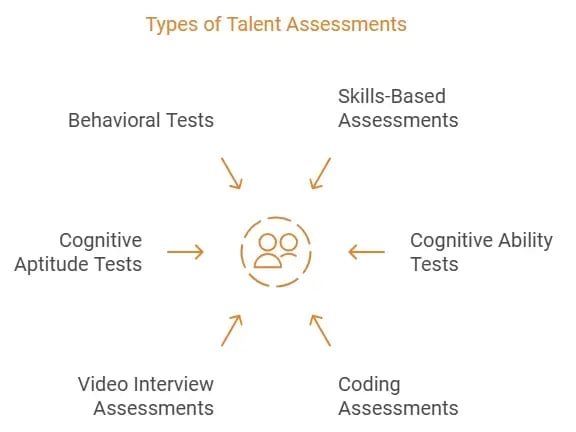Being in an authoritative position, how do you determine which applicant is better when two equally qualified applicants have solid resumes and pass the phone interview? Is there any specific quality about their ability to perform the work you have not observed up until now?
And what if there were not only two candidates but ten or twenty of them? That is where a talent assessment comes into play. It shows how well the candidates can perform the duties they are being recruited for and how well they can integrate into the organization and the particular team.
By incorporating talent assessment tools, the number of candidates can be narrowed down to a few of the best-qualified ones. This helps evaluate candidates’ abilities while streamlining the hiring process.
If you have been wondering how to assess people’s worth, here are seven suitable types of talent assessment tests that may help with hiring activities.
What is talent assessment?
A talent assessment is a test to evaluate an individual's skill set, competence and ability to perform. Talent assessment generally gives statistically backed, objective insights regarding an individual’s skills and areas that require improvement.
They are usually administered towards the end of the recruitment process to screen applicants, although they can also be used to determine employees’ learning and other development purposes.
A survey by the Society for Human Resource Management (SHRM) found that 78% of respondents in the Human Resources (HR) department argued that the hiring quality in their organization had improved with the use of assessments.
Such tests are appropriate for any business, but their value is most evident in addressing the emerging trends in talent acquisition, such as assessing candidates for remote positions and checking for behavioral competence.
A talent assessment is not limited to one method, as it can also include the following:
- A structured interview
- A set of skills or personality tests
- A work sample
- A job trial or a simulation activity
Benefits of Talent Assessment
Here are some of the significant benefits offered by proper talent assessment:
1. Proper Identification of Candidates' Skills and Qualifications
Talent assessments are intended to determine which candidate is most suitable for a particular position. This process goes beyond a typical interview, evaluating strengths, knowledge, or aptitude skills.
2. Increased Level of Diversity at Workplaces
Talent assessments aim to eliminate biases in hiring and promotion by focusing solely on skills, behaviours and competencies. This is because most talent assessments do not consider a candidate's physical or personality features but focus on their abilities, skills and behaviours.
This way, filling a particular position becomes easier as the selectors do not use a subjective perspective in viewing the potential of each candidate’s ability to perform the job.
3. Faster Onboarding Process
A recent survey by the Society for Human Resource Management shows that, on average, hiring an employee costs about $4,700. The cost considers recruitment, candidate assessment, and new worker orientation.
Allowing such resources in acquiring employees, it only goes without saying that the most suitable person for that job must be employed. There is a process of assessing talent that allows for the selection of only the most appropriate candidates. Hence, this talent assessment process eliminates those individuals who simply ‘fail’ the tests.
4. More Satisfied Employees
This assessment usually offers high job contentment levels as the employees ensure they are well fit or suited for their jobs. Job satisfaction is also promoted in teams with skilled individuals.
|
Not sure how to assess the skills and competencies of potential candidates before hiring them? Take help from iMocha! |
Types of Talent Assessments
Here are the best types of talent assessments that companies can implement:
1. Skills-Based Assessments
Skill-specific assessments are developed to test the skills needed for a job. By applying real-life scenarios, organizations can find individuals with the right technical and soft skills.
iMocha, with over 3000 assessments spread through different domains, offers the preferred skills-based assessments for companies to focus on measurement accuracy.
| Explore our Top 12 skills assessment tools to optimize your hiring process. |
2. Cognitive Ability Tests
These cognitive ability tests measure the applicant's ability to use verbal and reasoning skills to solve various problems. This also applies to individuals known for their ability to learn quickly and make plans while dealing with complex issues in the working environment.
3. Coding Based Assessments
Coding assessments evaluate the candidates ' programming skills in practical work environments, which is perfect for a developer or engineering candidate.
iMocha’s Live Coding Interview Platform is one of the few platforms offering a complete coding environment that a recruiter can use to conduct an interview that includes live coding challenges.
Other features of the platform, such as code replay and more, make it preferred for technical roles.
4. Video Interview Assessments
Automated video interviews help assess soft skills and communication abilities in an objectively measurable way. This approach consists of artificial intelligence tools that determine the evaluation of each candidate, including their speech, gestures, and intonation, to maintain the exact expectations for all individuals interviewed.
With iMocha's automated video interview feature, companies can substantially decrease interview time by up to 70% while eliminating scheduling conflicts and other issues.
5. Cognitive Aptitude Tests
These tests measure general intelligence and abilities using verbal and non-verbal questions on reasoning, spatial awareness, memory, and mathematical capabilities. People who score high in cognitive aptitude tests tend to do better in jobs requiring higher thought and problem-solving abilities.
6. Behavioral and Situational Judgement Tests
Such tests place candidates in situations resembling the real work environment to see how they would behave in varying conditions. This helps organizations with decision-making and understanding the behaviour of candidates. These assessments are primarily done for positions requiring teamwork and high moral standards.

|
Dealing with higher attrition rates in your company? iMocha's skills assessments can help greatly! |
Conclusion
Skill assessments are crucial for selecting candidates with the right capabilities and values aligned with the organization.
iMocha, an AI-powered skills intelligence platform, helps with this process through varying features, including skills-based assessments, coding evaluation, video interviews, and more.
It helps optimize recruitment processes while providing actionable insights. As a result, companies can construct a strong strategy for attracting, assessing, and retaining personnel suited to the company's requirements and mindset.
FAQs
How to hire the best candidates with talent assessments?
Leverage specific talent assessment to measure people's skills, inclinations, and organizational fit. With the help of such analysis, companies can identify and hire the best candidates for the job.
Why is talent assessment important?
Talent assessments help organizations choose the right people for a job, which minimizes the time taken to hire and enhances productivity. Their forte is to objectively assess the candidate’s abilities and suitability to fill the available positions in the company.
How do you conduct a talent assessment?
To begin, it is essential to identify the primary skills and competencies required for the particular position. Then, appropriate assessment tools (including skills profiles and cognitive and behavioral tests) should be selected.
Testing should be carried out on a valid testing platform, and scored testing monitoring should be undertaken to determine the best candidates for the final interviews.
|
|

